Mental Health: Recovery Focused Care Plan for Marie's Recovery
VerifiedAdded on 2023/01/17
|11
|2557
|91
Report
AI Summary
This report details a recovery-focused mental health care plan for a patient named Marie, addressing her struggles with depression, anxiety, and feelings of guilt related to her role as a mother and her social isolation. The plan identifies three consumer priorities: addressing feelings of guilt and suicidal thoughts, encouraging participation in daily activities, and regaining a sense of self-worth and work engagement. Each priority includes specific goals, HONOS scores, identified strengths, and a series of consumer and nursing interventions. The interventions involve family support, case manager involvement, self-help education, and encouragement of social activities. The plan also includes timelines for review and monitoring of Marie's progress, emphasizing a collaborative approach between the patient, her family, and healthcare professionals. The report highlights the importance of assessing and addressing Marie's emotional and practical needs to facilitate her recovery and improve her overall quality of life, including her ability to care for her child and engage in daily activities.
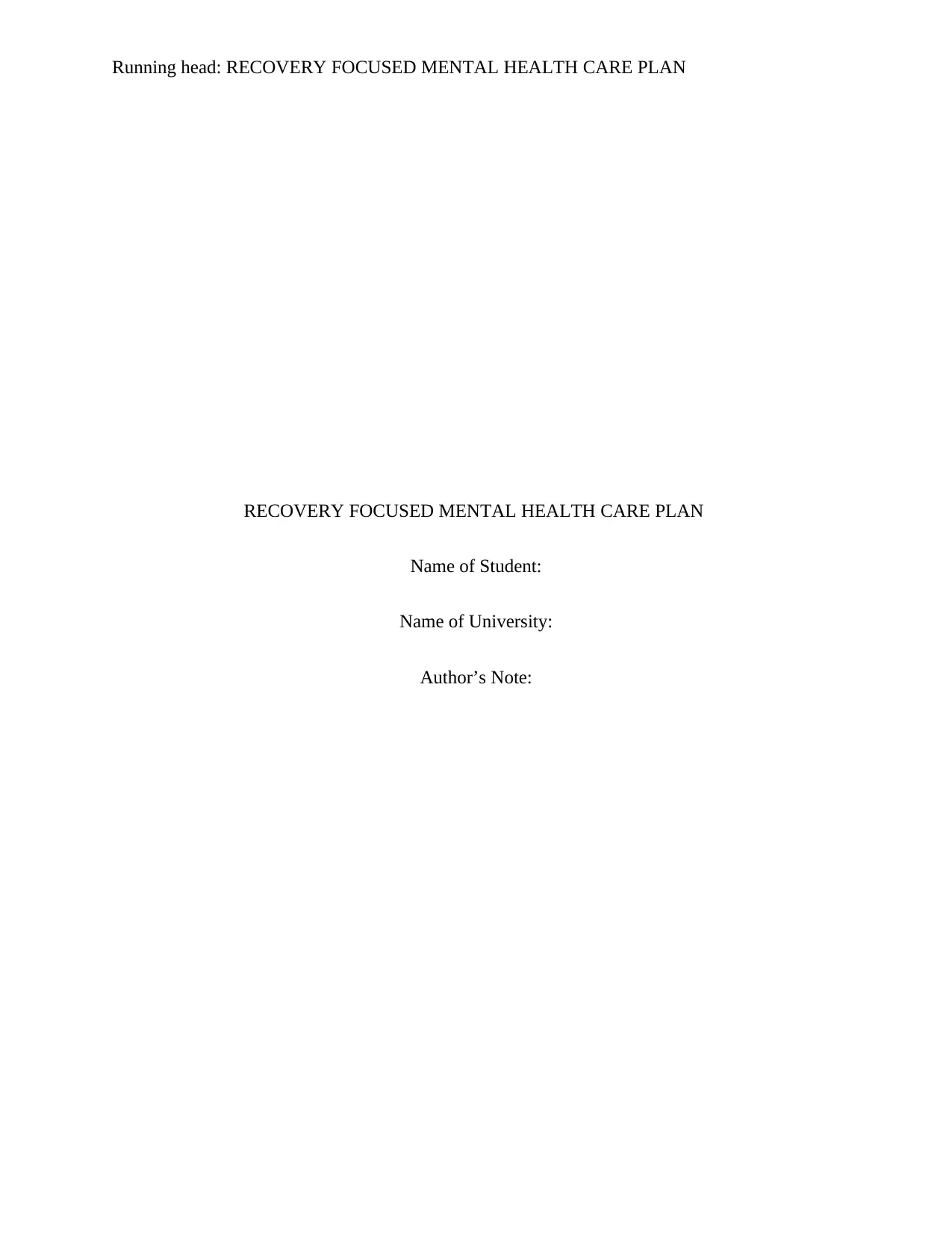
Running head: RECOVERY FOCUSED MENTAL HEALTH CARE PLAN
RECOVERY FOCUSED MENTAL HEALTH CARE PLAN
Name of Student:
Name of University:
Author’s Note:
RECOVERY FOCUSED MENTAL HEALTH CARE PLAN
Name of Student:
Name of University:
Author’s Note:
Paraphrase This Document
Need a fresh take? Get an instant paraphrase of this document with our AI Paraphraser
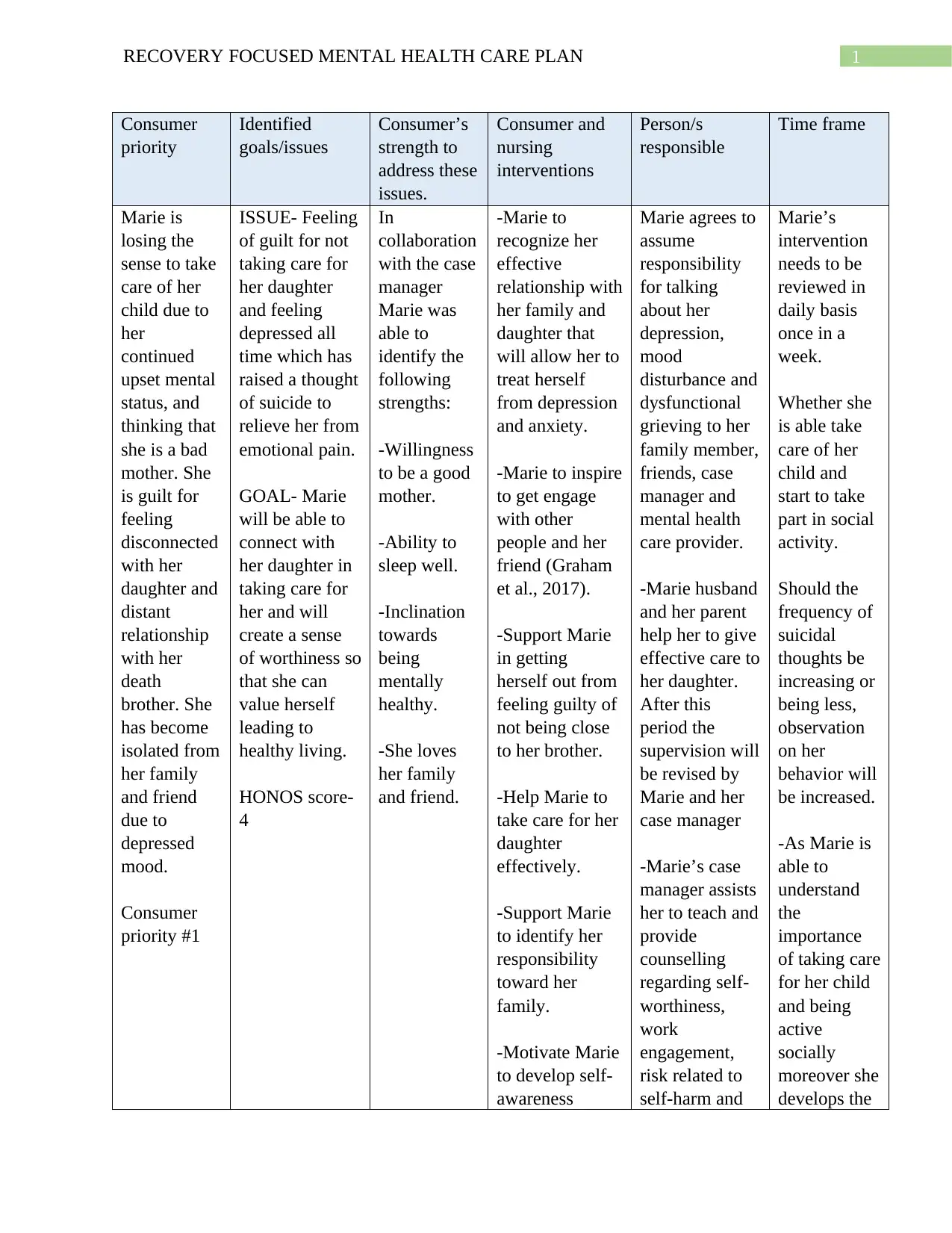
1RECOVERY FOCUSED MENTAL HEALTH CARE PLAN
Consumer
priority
Identified
goals/issues
Consumer’s
strength to
address these
issues.
Consumer and
nursing
interventions
Person/s
responsible
Time frame
Marie is
losing the
sense to take
care of her
child due to
her
continued
upset mental
status, and
thinking that
she is a bad
mother. She
is guilt for
feeling
disconnected
with her
daughter and
distant
relationship
with her
death
brother. She
has become
isolated from
her family
and friend
due to
depressed
mood.
Consumer
priority #1
ISSUE- Feeling
of guilt for not
taking care for
her daughter
and feeling
depressed all
time which has
raised a thought
of suicide to
relieve her from
emotional pain.
GOAL- Marie
will be able to
connect with
her daughter in
taking care for
her and will
create a sense
of worthiness so
that she can
value herself
leading to
healthy living.
HONOS score-
4
In
collaboration
with the case
manager
Marie was
able to
identify the
following
strengths:
-Willingness
to be a good
mother.
-Ability to
sleep well.
-Inclination
towards
being
mentally
healthy.
-She loves
her family
and friend.
-Marie to
recognize her
effective
relationship with
her family and
daughter that
will allow her to
treat herself
from depression
and anxiety.
-Marie to inspire
to get engage
with other
people and her
friend (Graham
et al., 2017).
-Support Marie
in getting
herself out from
feeling guilty of
not being close
to her brother.
-Help Marie to
take care for her
daughter
effectively.
-Support Marie
to identify her
responsibility
toward her
family.
-Motivate Marie
to develop self-
awareness
Marie agrees to
assume
responsibility
for talking
about her
depression,
mood
disturbance and
dysfunctional
grieving to her
family member,
friends, case
manager and
mental health
care provider.
-Marie husband
and her parent
help her to give
effective care to
her daughter.
After this
period the
supervision will
be revised by
Marie and her
case manager
-Marie’s case
manager assists
her to teach and
provide
counselling
regarding self-
worthiness,
work
engagement,
risk related to
self-harm and
Marie’s
intervention
needs to be
reviewed in
daily basis
once in a
week.
Whether she
is able take
care of her
child and
start to take
part in social
activity.
Should the
frequency of
suicidal
thoughts be
increasing or
being less,
observation
on her
behavior will
be increased.
-As Marie is
able to
understand
the
importance
of taking care
for her child
and being
active
socially
moreover she
develops the
Consumer
priority
Identified
goals/issues
Consumer’s
strength to
address these
issues.
Consumer and
nursing
interventions
Person/s
responsible
Time frame
Marie is
losing the
sense to take
care of her
child due to
her
continued
upset mental
status, and
thinking that
she is a bad
mother. She
is guilt for
feeling
disconnected
with her
daughter and
distant
relationship
with her
death
brother. She
has become
isolated from
her family
and friend
due to
depressed
mood.
Consumer
priority #1
ISSUE- Feeling
of guilt for not
taking care for
her daughter
and feeling
depressed all
time which has
raised a thought
of suicide to
relieve her from
emotional pain.
GOAL- Marie
will be able to
connect with
her daughter in
taking care for
her and will
create a sense
of worthiness so
that she can
value herself
leading to
healthy living.
HONOS score-
4
In
collaboration
with the case
manager
Marie was
able to
identify the
following
strengths:
-Willingness
to be a good
mother.
-Ability to
sleep well.
-Inclination
towards
being
mentally
healthy.
-She loves
her family
and friend.
-Marie to
recognize her
effective
relationship with
her family and
daughter that
will allow her to
treat herself
from depression
and anxiety.
-Marie to inspire
to get engage
with other
people and her
friend (Graham
et al., 2017).
-Support Marie
in getting
herself out from
feeling guilty of
not being close
to her brother.
-Help Marie to
take care for her
daughter
effectively.
-Support Marie
to identify her
responsibility
toward her
family.
-Motivate Marie
to develop self-
awareness
Marie agrees to
assume
responsibility
for talking
about her
depression,
mood
disturbance and
dysfunctional
grieving to her
family member,
friends, case
manager and
mental health
care provider.
-Marie husband
and her parent
help her to give
effective care to
her daughter.
After this
period the
supervision will
be revised by
Marie and her
case manager
-Marie’s case
manager assists
her to teach and
provide
counselling
regarding self-
worthiness,
work
engagement,
risk related to
self-harm and
Marie’s
intervention
needs to be
reviewed in
daily basis
once in a
week.
Whether she
is able take
care of her
child and
start to take
part in social
activity.
Should the
frequency of
suicidal
thoughts be
increasing or
being less,
observation
on her
behavior will
be increased.
-As Marie is
able to
understand
the
importance
of taking care
for her child
and being
active
socially
moreover she
develops the
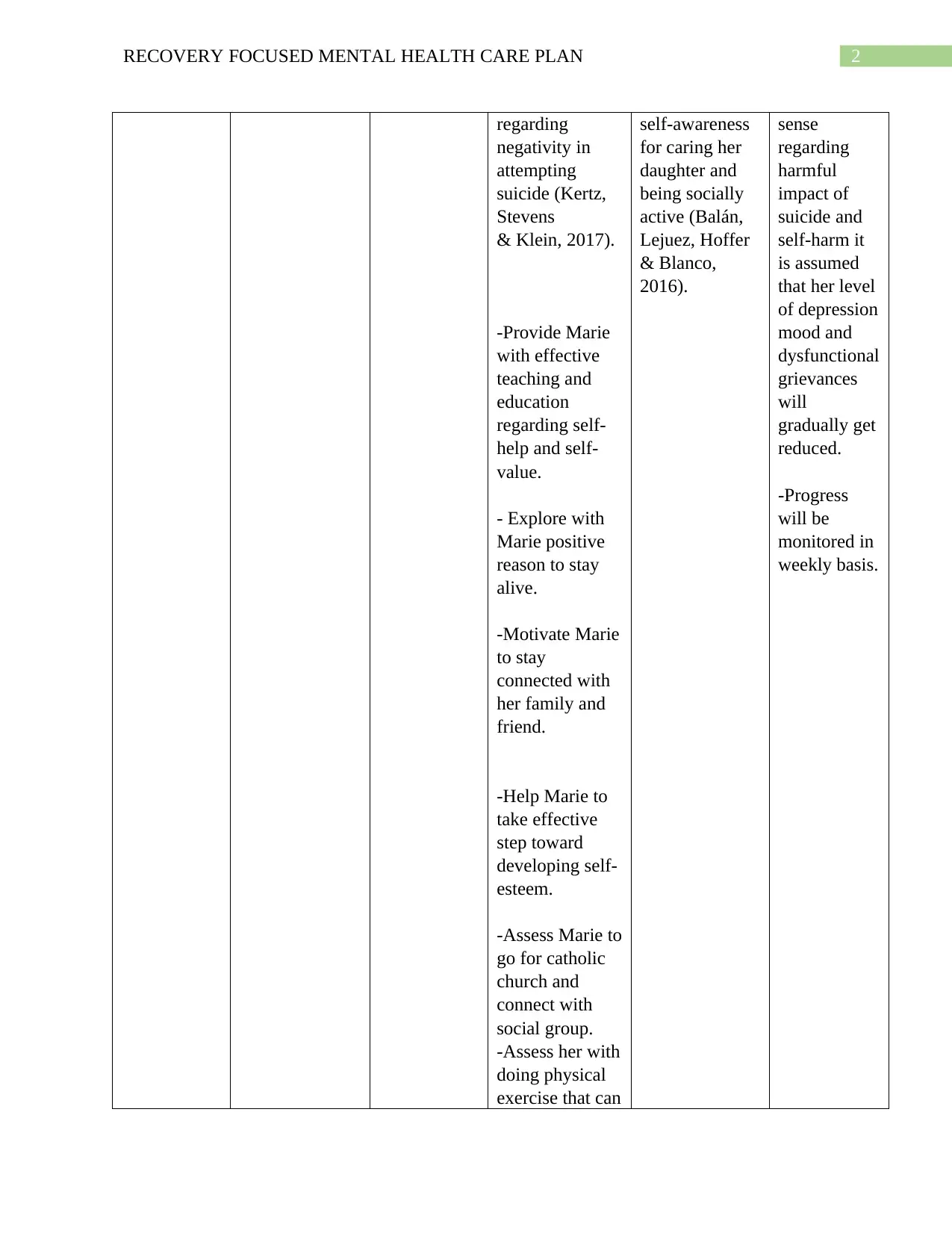
2RECOVERY FOCUSED MENTAL HEALTH CARE PLAN
regarding
negativity in
attempting
suicide (Kertz,
Stevens
& Klein, 2017).
-Provide Marie
with effective
teaching and
education
regarding self-
help and self-
value.
- Explore with
Marie positive
reason to stay
alive.
-Motivate Marie
to stay
connected with
her family and
friend.
-Help Marie to
take effective
step toward
developing self-
esteem.
-Assess Marie to
go for catholic
church and
connect with
social group.
-Assess her with
doing physical
exercise that can
self-awareness
for caring her
daughter and
being socially
active (Balán,
Lejuez, Hoffer
& Blanco,
2016).
sense
regarding
harmful
impact of
suicide and
self-harm it
is assumed
that her level
of depression
mood and
dysfunctional
grievances
will
gradually get
reduced.
-Progress
will be
monitored in
weekly basis.
regarding
negativity in
attempting
suicide (Kertz,
Stevens
& Klein, 2017).
-Provide Marie
with effective
teaching and
education
regarding self-
help and self-
value.
- Explore with
Marie positive
reason to stay
alive.
-Motivate Marie
to stay
connected with
her family and
friend.
-Help Marie to
take effective
step toward
developing self-
esteem.
-Assess Marie to
go for catholic
church and
connect with
social group.
-Assess her with
doing physical
exercise that can
self-awareness
for caring her
daughter and
being socially
active (Balán,
Lejuez, Hoffer
& Blanco,
2016).
sense
regarding
harmful
impact of
suicide and
self-harm it
is assumed
that her level
of depression
mood and
dysfunctional
grievances
will
gradually get
reduced.
-Progress
will be
monitored in
weekly basis.
⊘ This is a preview!⊘
Do you want full access?
Subscribe today to unlock all pages.

Trusted by 1+ million students worldwide
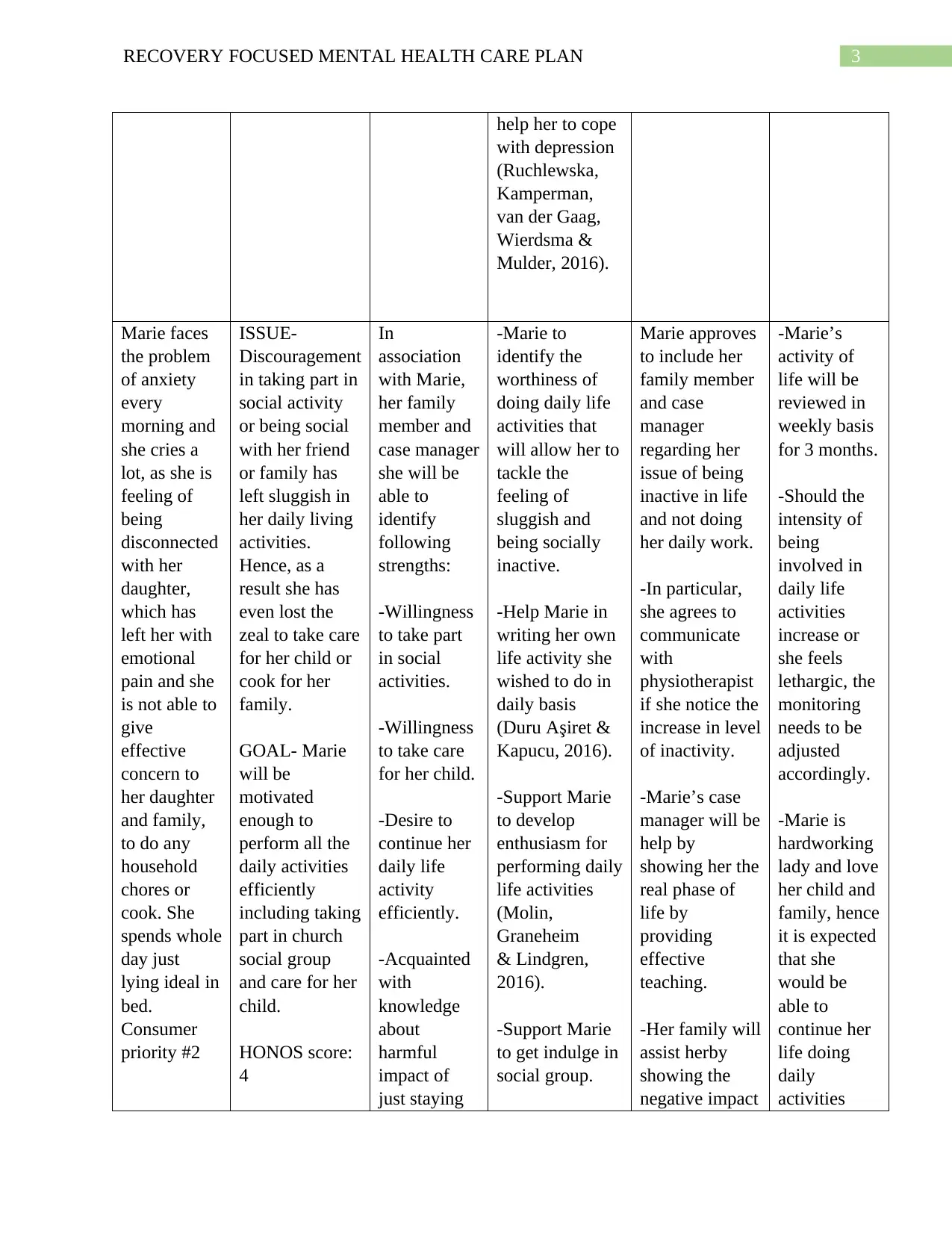
3RECOVERY FOCUSED MENTAL HEALTH CARE PLAN
help her to cope
with depression
(Ruchlewska,
Kamperman,
van der Gaag,
Wierdsma &
Mulder, 2016).
Marie faces
the problem
of anxiety
every
morning and
she cries a
lot, as she is
feeling of
being
disconnected
with her
daughter,
which has
left her with
emotional
pain and she
is not able to
give
effective
concern to
her daughter
and family,
to do any
household
chores or
cook. She
spends whole
day just
lying ideal in
bed.
Consumer
priority #2
ISSUE-
Discouragement
in taking part in
social activity
or being social
with her friend
or family has
left sluggish in
her daily living
activities.
Hence, as a
result she has
even lost the
zeal to take care
for her child or
cook for her
family.
GOAL- Marie
will be
motivated
enough to
perform all the
daily activities
efficiently
including taking
part in church
social group
and care for her
child.
HONOS score:
4
In
association
with Marie,
her family
member and
case manager
she will be
able to
identify
following
strengths:
-Willingness
to take part
in social
activities.
-Willingness
to take care
for her child.
-Desire to
continue her
daily life
activity
efficiently.
-Acquainted
with
knowledge
about
harmful
impact of
just staying
-Marie to
identify the
worthiness of
doing daily life
activities that
will allow her to
tackle the
feeling of
sluggish and
being socially
inactive.
-Help Marie in
writing her own
life activity she
wished to do in
daily basis
(Duru Aşiret &
Kapucu, 2016).
-Support Marie
to develop
enthusiasm for
performing daily
life activities
(Molin,
Graneheim
& Lindgren,
2016).
-Support Marie
to get indulge in
social group.
Marie approves
to include her
family member
and case
manager
regarding her
issue of being
inactive in life
and not doing
her daily work.
-In particular,
she agrees to
communicate
with
physiotherapist
if she notice the
increase in level
of inactivity.
-Marie’s case
manager will be
help by
showing her the
real phase of
life by
providing
effective
teaching.
-Her family will
assist herby
showing the
negative impact
-Marie’s
activity of
life will be
reviewed in
weekly basis
for 3 months.
-Should the
intensity of
being
involved in
daily life
activities
increase or
she feels
lethargic, the
monitoring
needs to be
adjusted
accordingly.
-Marie is
hardworking
lady and love
her child and
family, hence
it is expected
that she
would be
able to
continue her
life doing
daily
activities
help her to cope
with depression
(Ruchlewska,
Kamperman,
van der Gaag,
Wierdsma &
Mulder, 2016).
Marie faces
the problem
of anxiety
every
morning and
she cries a
lot, as she is
feeling of
being
disconnected
with her
daughter,
which has
left her with
emotional
pain and she
is not able to
give
effective
concern to
her daughter
and family,
to do any
household
chores or
cook. She
spends whole
day just
lying ideal in
bed.
Consumer
priority #2
ISSUE-
Discouragement
in taking part in
social activity
or being social
with her friend
or family has
left sluggish in
her daily living
activities.
Hence, as a
result she has
even lost the
zeal to take care
for her child or
cook for her
family.
GOAL- Marie
will be
motivated
enough to
perform all the
daily activities
efficiently
including taking
part in church
social group
and care for her
child.
HONOS score:
4
In
association
with Marie,
her family
member and
case manager
she will be
able to
identify
following
strengths:
-Willingness
to take part
in social
activities.
-Willingness
to take care
for her child.
-Desire to
continue her
daily life
activity
efficiently.
-Acquainted
with
knowledge
about
harmful
impact of
just staying
-Marie to
identify the
worthiness of
doing daily life
activities that
will allow her to
tackle the
feeling of
sluggish and
being socially
inactive.
-Help Marie in
writing her own
life activity she
wished to do in
daily basis
(Duru Aşiret &
Kapucu, 2016).
-Support Marie
to develop
enthusiasm for
performing daily
life activities
(Molin,
Graneheim
& Lindgren,
2016).
-Support Marie
to get indulge in
social group.
Marie approves
to include her
family member
and case
manager
regarding her
issue of being
inactive in life
and not doing
her daily work.
-In particular,
she agrees to
communicate
with
physiotherapist
if she notice the
increase in level
of inactivity.
-Marie’s case
manager will be
help by
showing her the
real phase of
life by
providing
effective
teaching.
-Her family will
assist herby
showing the
negative impact
-Marie’s
activity of
life will be
reviewed in
weekly basis
for 3 months.
-Should the
intensity of
being
involved in
daily life
activities
increase or
she feels
lethargic, the
monitoring
needs to be
adjusted
accordingly.
-Marie is
hardworking
lady and love
her child and
family, hence
it is expected
that she
would be
able to
continue her
life doing
daily
activities
Paraphrase This Document
Need a fresh take? Get an instant paraphrase of this document with our AI Paraphraser
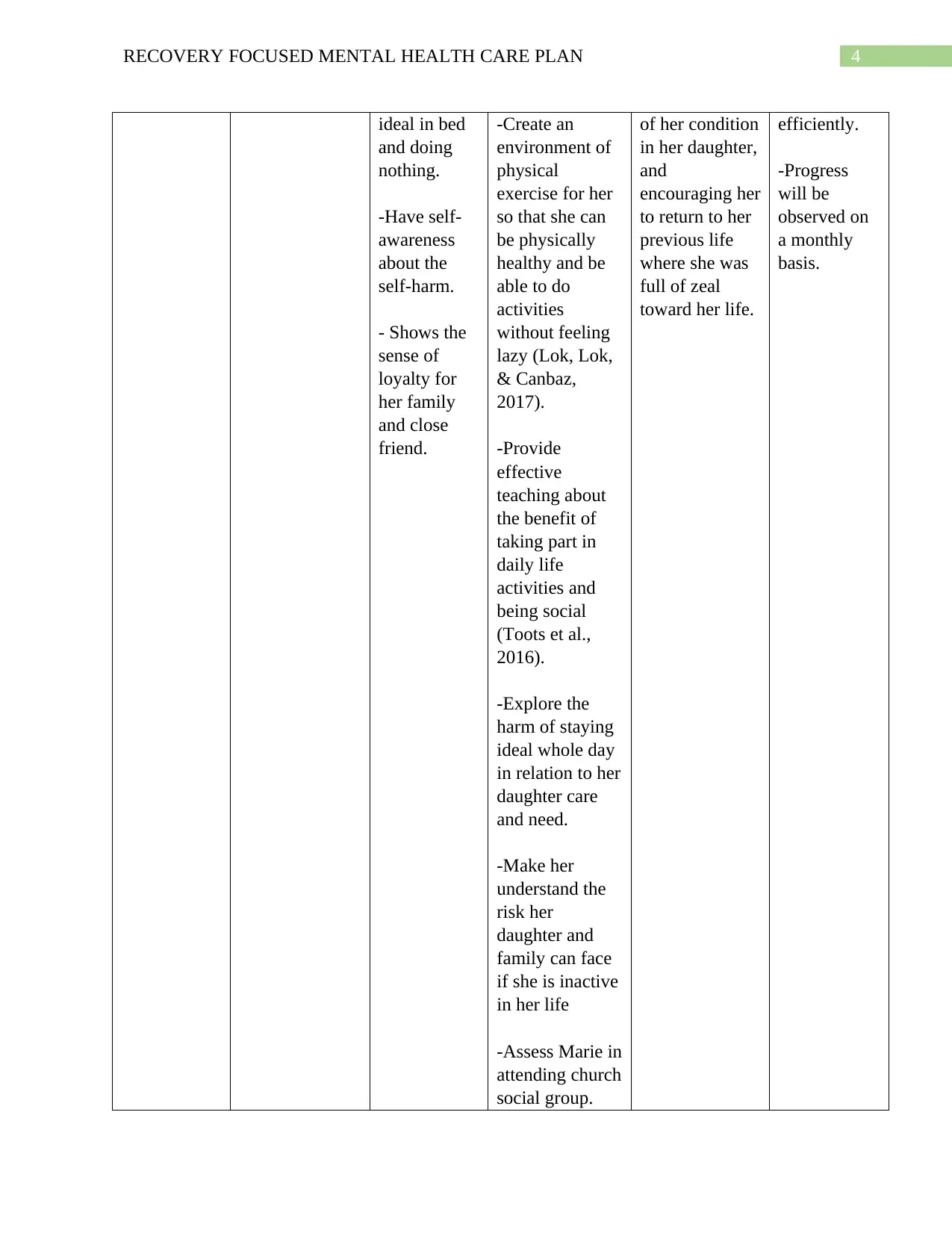
4RECOVERY FOCUSED MENTAL HEALTH CARE PLAN
ideal in bed
and doing
nothing.
-Have self-
awareness
about the
self-harm.
- Shows the
sense of
loyalty for
her family
and close
friend.
-Create an
environment of
physical
exercise for her
so that she can
be physically
healthy and be
able to do
activities
without feeling
lazy (Lok, Lok,
& Canbaz,
2017).
-Provide
effective
teaching about
the benefit of
taking part in
daily life
activities and
being social
(Toots et al.,
2016).
-Explore the
harm of staying
ideal whole day
in relation to her
daughter care
and need.
-Make her
understand the
risk her
daughter and
family can face
if she is inactive
in her life
-Assess Marie in
attending church
social group.
of her condition
in her daughter,
and
encouraging her
to return to her
previous life
where she was
full of zeal
toward her life.
efficiently.
-Progress
will be
observed on
a monthly
basis.
ideal in bed
and doing
nothing.
-Have self-
awareness
about the
self-harm.
- Shows the
sense of
loyalty for
her family
and close
friend.
-Create an
environment of
physical
exercise for her
so that she can
be physically
healthy and be
able to do
activities
without feeling
lazy (Lok, Lok,
& Canbaz,
2017).
-Provide
effective
teaching about
the benefit of
taking part in
daily life
activities and
being social
(Toots et al.,
2016).
-Explore the
harm of staying
ideal whole day
in relation to her
daughter care
and need.
-Make her
understand the
risk her
daughter and
family can face
if she is inactive
in her life
-Assess Marie in
attending church
social group.
of her condition
in her daughter,
and
encouraging her
to return to her
previous life
where she was
full of zeal
toward her life.
efficiently.
-Progress
will be
observed on
a monthly
basis.
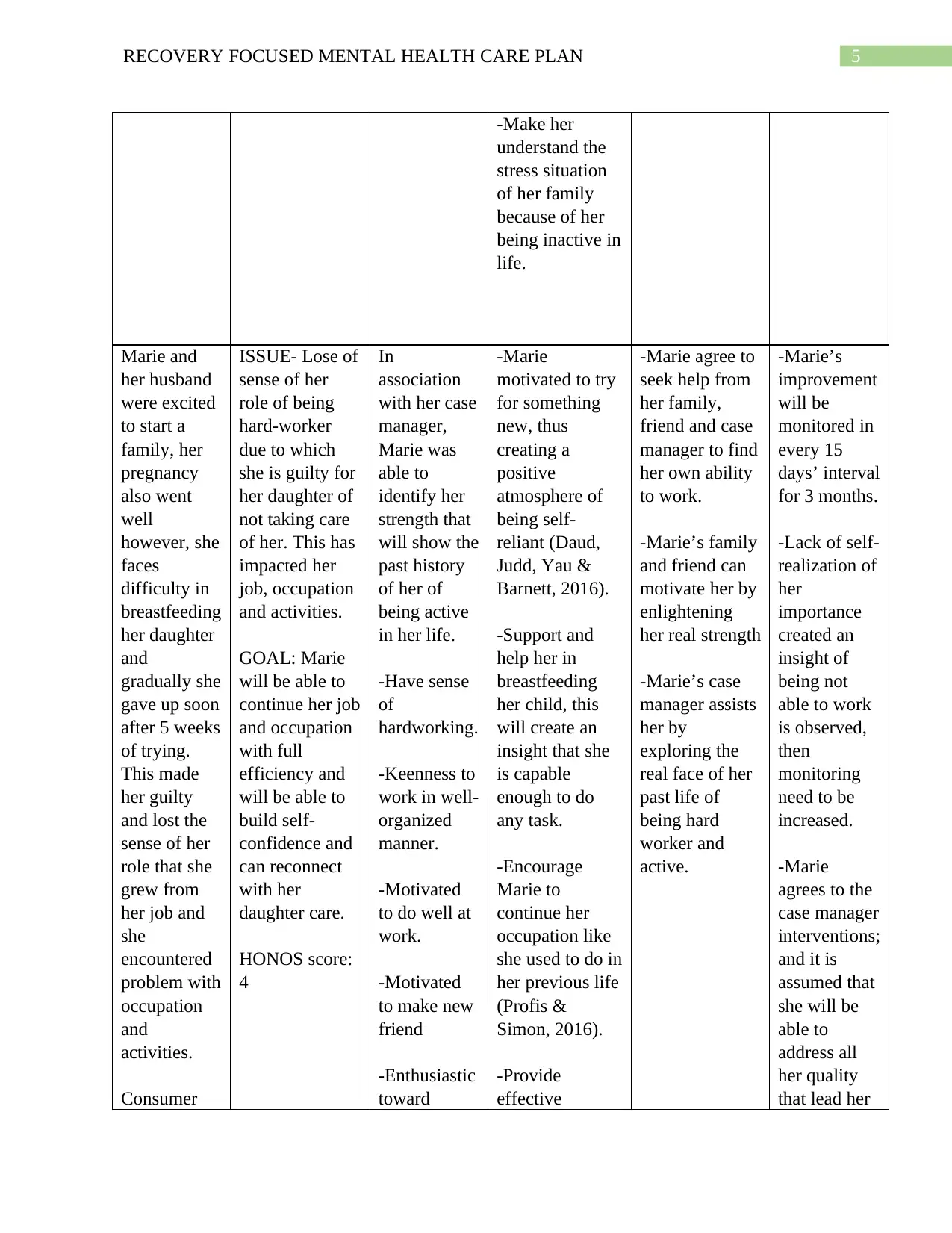
5RECOVERY FOCUSED MENTAL HEALTH CARE PLAN
-Make her
understand the
stress situation
of her family
because of her
being inactive in
life.
Marie and
her husband
were excited
to start a
family, her
pregnancy
also went
well
however, she
faces
difficulty in
breastfeeding
her daughter
and
gradually she
gave up soon
after 5 weeks
of trying.
This made
her guilty
and lost the
sense of her
role that she
grew from
her job and
she
encountered
problem with
occupation
and
activities.
Consumer
ISSUE- Lose of
sense of her
role of being
hard-worker
due to which
she is guilty for
her daughter of
not taking care
of her. This has
impacted her
job, occupation
and activities.
GOAL: Marie
will be able to
continue her job
and occupation
with full
efficiency and
will be able to
build self-
confidence and
can reconnect
with her
daughter care.
HONOS score:
4
In
association
with her case
manager,
Marie was
able to
identify her
strength that
will show the
past history
of her of
being active
in her life.
-Have sense
of
hardworking.
-Keenness to
work in well-
organized
manner.
-Motivated
to do well at
work.
-Motivated
to make new
friend
-Enthusiastic
toward
-Marie
motivated to try
for something
new, thus
creating a
positive
atmosphere of
being self-
reliant (Daud,
Judd, Yau &
Barnett, 2016).
-Support and
help her in
breastfeeding
her child, this
will create an
insight that she
is capable
enough to do
any task.
-Encourage
Marie to
continue her
occupation like
she used to do in
her previous life
(Profis &
Simon, 2016).
-Provide
effective
-Marie agree to
seek help from
her family,
friend and case
manager to find
her own ability
to work.
-Marie’s family
and friend can
motivate her by
enlightening
her real strength
-Marie’s case
manager assists
her by
exploring the
real face of her
past life of
being hard
worker and
active.
-Marie’s
improvement
will be
monitored in
every 15
days’ interval
for 3 months.
-Lack of self-
realization of
her
importance
created an
insight of
being not
able to work
is observed,
then
monitoring
need to be
increased.
-Marie
agrees to the
case manager
interventions;
and it is
assumed that
she will be
able to
address all
her quality
that lead her
-Make her
understand the
stress situation
of her family
because of her
being inactive in
life.
Marie and
her husband
were excited
to start a
family, her
pregnancy
also went
well
however, she
faces
difficulty in
breastfeeding
her daughter
and
gradually she
gave up soon
after 5 weeks
of trying.
This made
her guilty
and lost the
sense of her
role that she
grew from
her job and
she
encountered
problem with
occupation
and
activities.
Consumer
ISSUE- Lose of
sense of her
role of being
hard-worker
due to which
she is guilty for
her daughter of
not taking care
of her. This has
impacted her
job, occupation
and activities.
GOAL: Marie
will be able to
continue her job
and occupation
with full
efficiency and
will be able to
build self-
confidence and
can reconnect
with her
daughter care.
HONOS score:
4
In
association
with her case
manager,
Marie was
able to
identify her
strength that
will show the
past history
of her of
being active
in her life.
-Have sense
of
hardworking.
-Keenness to
work in well-
organized
manner.
-Motivated
to do well at
work.
-Motivated
to make new
friend
-Enthusiastic
toward
-Marie
motivated to try
for something
new, thus
creating a
positive
atmosphere of
being self-
reliant (Daud,
Judd, Yau &
Barnett, 2016).
-Support and
help her in
breastfeeding
her child, this
will create an
insight that she
is capable
enough to do
any task.
-Encourage
Marie to
continue her
occupation like
she used to do in
her previous life
(Profis &
Simon, 2016).
-Provide
effective
-Marie agree to
seek help from
her family,
friend and case
manager to find
her own ability
to work.
-Marie’s family
and friend can
motivate her by
enlightening
her real strength
-Marie’s case
manager assists
her by
exploring the
real face of her
past life of
being hard
worker and
active.
-Marie’s
improvement
will be
monitored in
every 15
days’ interval
for 3 months.
-Lack of self-
realization of
her
importance
created an
insight of
being not
able to work
is observed,
then
monitoring
need to be
increased.
-Marie
agrees to the
case manager
interventions;
and it is
assumed that
she will be
able to
address all
her quality
that lead her
⊘ This is a preview!⊘
Do you want full access?
Subscribe today to unlock all pages.

Trusted by 1+ million students worldwide
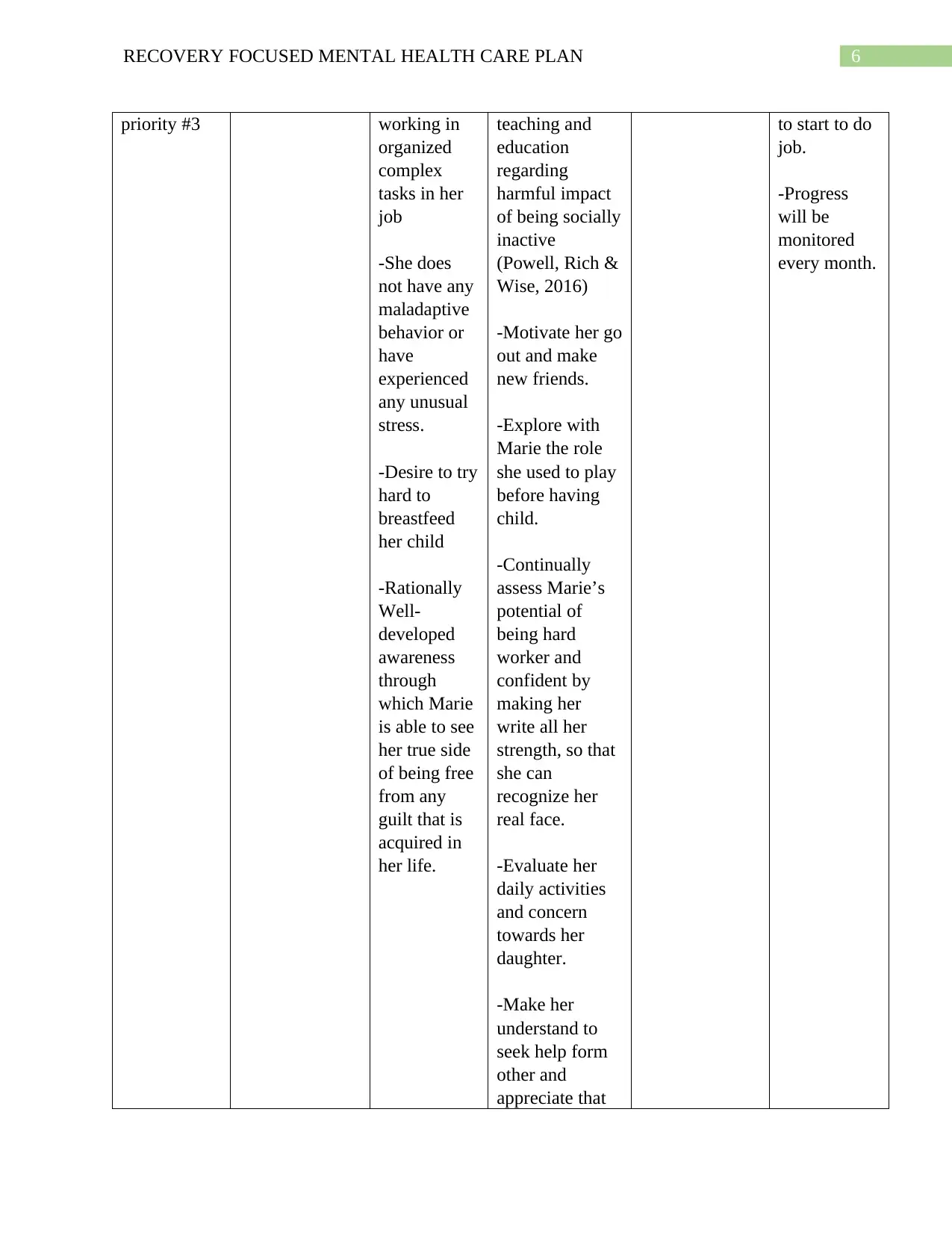
6RECOVERY FOCUSED MENTAL HEALTH CARE PLAN
priority #3 working in
organized
complex
tasks in her
job
-She does
not have any
maladaptive
behavior or
have
experienced
any unusual
stress.
-Desire to try
hard to
breastfeed
her child
-Rationally
Well-
developed
awareness
through
which Marie
is able to see
her true side
of being free
from any
guilt that is
acquired in
her life.
teaching and
education
regarding
harmful impact
of being socially
inactive
(Powell, Rich &
Wise, 2016)
-Motivate her go
out and make
new friends.
-Explore with
Marie the role
she used to play
before having
child.
-Continually
assess Marie’s
potential of
being hard
worker and
confident by
making her
write all her
strength, so that
she can
recognize her
real face.
-Evaluate her
daily activities
and concern
towards her
daughter.
-Make her
understand to
seek help form
other and
appreciate that
to start to do
job.
-Progress
will be
monitored
every month.
priority #3 working in
organized
complex
tasks in her
job
-She does
not have any
maladaptive
behavior or
have
experienced
any unusual
stress.
-Desire to try
hard to
breastfeed
her child
-Rationally
Well-
developed
awareness
through
which Marie
is able to see
her true side
of being free
from any
guilt that is
acquired in
her life.
teaching and
education
regarding
harmful impact
of being socially
inactive
(Powell, Rich &
Wise, 2016)
-Motivate her go
out and make
new friends.
-Explore with
Marie the role
she used to play
before having
child.
-Continually
assess Marie’s
potential of
being hard
worker and
confident by
making her
write all her
strength, so that
she can
recognize her
real face.
-Evaluate her
daily activities
and concern
towards her
daughter.
-Make her
understand to
seek help form
other and
appreciate that
to start to do
job.
-Progress
will be
monitored
every month.
Paraphrase This Document
Need a fresh take? Get an instant paraphrase of this document with our AI Paraphraser
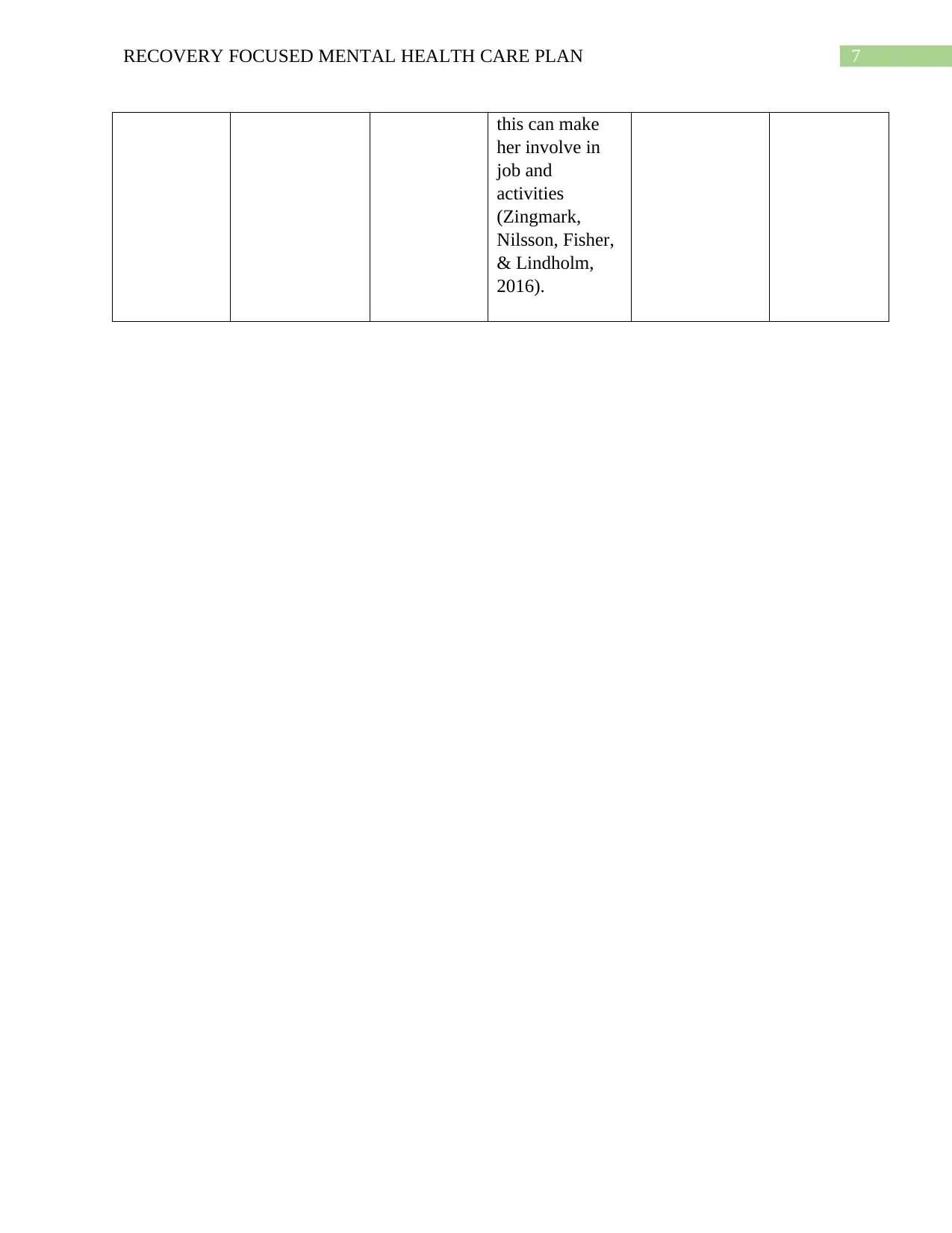
7RECOVERY FOCUSED MENTAL HEALTH CARE PLAN
this can make
her involve in
job and
activities
(Zingmark,
Nilsson, Fisher,
& Lindholm,
2016).
this can make
her involve in
job and
activities
(Zingmark,
Nilsson, Fisher,
& Lindholm,
2016).
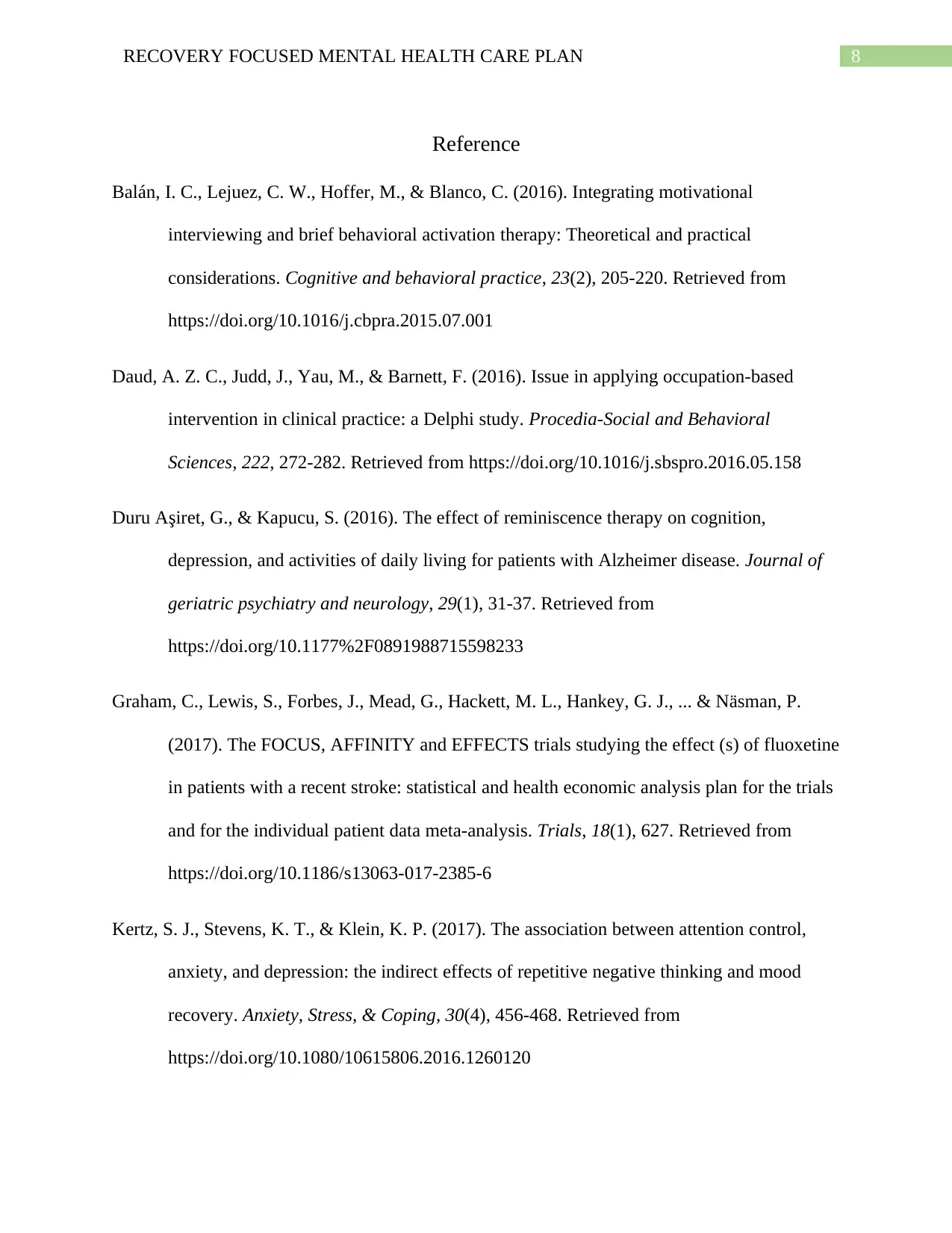
8RECOVERY FOCUSED MENTAL HEALTH CARE PLAN
Reference
Balán, I. C., Lejuez, C. W., Hoffer, M., & Blanco, C. (2016). Integrating motivational
interviewing and brief behavioral activation therapy: Theoretical and practical
considerations. Cognitive and behavioral practice, 23(2), 205-220. Retrieved from
https://doi.org/10.1016/j.cbpra.2015.07.001
Daud, A. Z. C., Judd, J., Yau, M., & Barnett, F. (2016). Issue in applying occupation-based
intervention in clinical practice: a Delphi study. Procedia-Social and Behavioral
Sciences, 222, 272-282. Retrieved from https://doi.org/10.1016/j.sbspro.2016.05.158
Duru Aşiret, G., & Kapucu, S. (2016). The effect of reminiscence therapy on cognition,
depression, and activities of daily living for patients with Alzheimer disease. Journal of
geriatric psychiatry and neurology, 29(1), 31-37. Retrieved from
https://doi.org/10.1177%2F0891988715598233
Graham, C., Lewis, S., Forbes, J., Mead, G., Hackett, M. L., Hankey, G. J., ... & Näsman, P.
(2017). The FOCUS, AFFINITY and EFFECTS trials studying the effect (s) of fluoxetine
in patients with a recent stroke: statistical and health economic analysis plan for the trials
and for the individual patient data meta-analysis. Trials, 18(1), 627. Retrieved from
https://doi.org/10.1186/s13063-017-2385-6
Kertz, S. J., Stevens, K. T., & Klein, K. P. (2017). The association between attention control,
anxiety, and depression: the indirect effects of repetitive negative thinking and mood
recovery. Anxiety, Stress, & Coping, 30(4), 456-468. Retrieved from
https://doi.org/10.1080/10615806.2016.1260120
Reference
Balán, I. C., Lejuez, C. W., Hoffer, M., & Blanco, C. (2016). Integrating motivational
interviewing and brief behavioral activation therapy: Theoretical and practical
considerations. Cognitive and behavioral practice, 23(2), 205-220. Retrieved from
https://doi.org/10.1016/j.cbpra.2015.07.001
Daud, A. Z. C., Judd, J., Yau, M., & Barnett, F. (2016). Issue in applying occupation-based
intervention in clinical practice: a Delphi study. Procedia-Social and Behavioral
Sciences, 222, 272-282. Retrieved from https://doi.org/10.1016/j.sbspro.2016.05.158
Duru Aşiret, G., & Kapucu, S. (2016). The effect of reminiscence therapy on cognition,
depression, and activities of daily living for patients with Alzheimer disease. Journal of
geriatric psychiatry and neurology, 29(1), 31-37. Retrieved from
https://doi.org/10.1177%2F0891988715598233
Graham, C., Lewis, S., Forbes, J., Mead, G., Hackett, M. L., Hankey, G. J., ... & Näsman, P.
(2017). The FOCUS, AFFINITY and EFFECTS trials studying the effect (s) of fluoxetine
in patients with a recent stroke: statistical and health economic analysis plan for the trials
and for the individual patient data meta-analysis. Trials, 18(1), 627. Retrieved from
https://doi.org/10.1186/s13063-017-2385-6
Kertz, S. J., Stevens, K. T., & Klein, K. P. (2017). The association between attention control,
anxiety, and depression: the indirect effects of repetitive negative thinking and mood
recovery. Anxiety, Stress, & Coping, 30(4), 456-468. Retrieved from
https://doi.org/10.1080/10615806.2016.1260120
⊘ This is a preview!⊘
Do you want full access?
Subscribe today to unlock all pages.

Trusted by 1+ million students worldwide
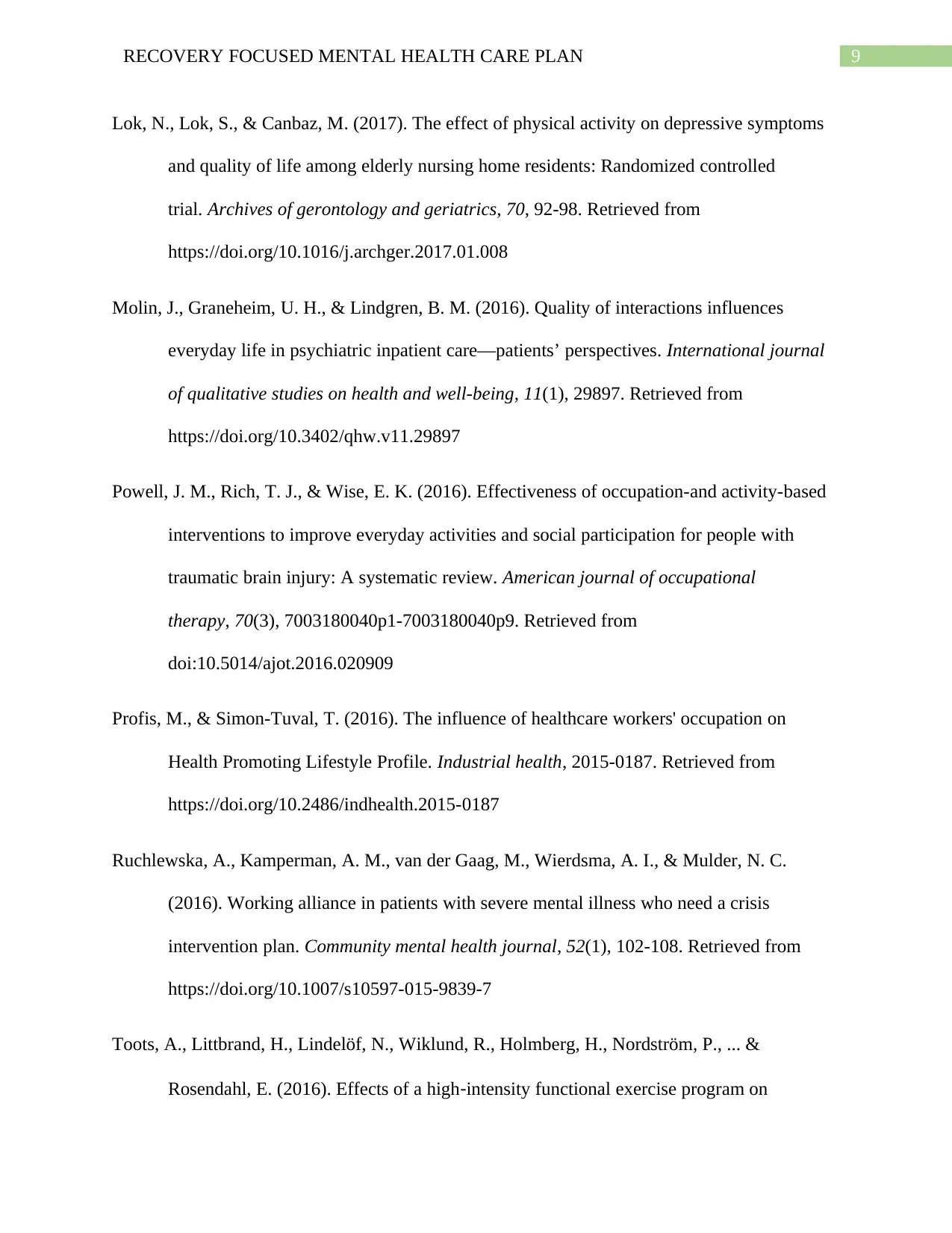
9RECOVERY FOCUSED MENTAL HEALTH CARE PLAN
Lok, N., Lok, S., & Canbaz, M. (2017). The effect of physical activity on depressive symptoms
and quality of life among elderly nursing home residents: Randomized controlled
trial. Archives of gerontology and geriatrics, 70, 92-98. Retrieved from
https://doi.org/10.1016/j.archger.2017.01.008
Molin, J., Graneheim, U. H., & Lindgren, B. M. (2016). Quality of interactions influences
everyday life in psychiatric inpatient care—patients’ perspectives. International journal
of qualitative studies on health and well-being, 11(1), 29897. Retrieved from
https://doi.org/10.3402/qhw.v11.29897
Powell, J. M., Rich, T. J., & Wise, E. K. (2016). Effectiveness of occupation-and activity-based
interventions to improve everyday activities and social participation for people with
traumatic brain injury: A systematic review. American journal of occupational
therapy, 70(3), 7003180040p1-7003180040p9. Retrieved from
doi:10.5014/ajot.2016.020909
Profis, M., & Simon-Tuval, T. (2016). The influence of healthcare workers' occupation on
Health Promoting Lifestyle Profile. Industrial health, 2015-0187. Retrieved from
https://doi.org/10.2486/indhealth.2015-0187
Ruchlewska, A., Kamperman, A. M., van der Gaag, M., Wierdsma, A. I., & Mulder, N. C.
(2016). Working alliance in patients with severe mental illness who need a crisis
intervention plan. Community mental health journal, 52(1), 102-108. Retrieved from
https://doi.org/10.1007/s10597-015-9839-7
Toots, A., Littbrand, H., Lindelöf, N., Wiklund, R., Holmberg, H., Nordström, P., ... &
Rosendahl, E. (2016). Effects of a high‐intensity functional exercise program on
Lok, N., Lok, S., & Canbaz, M. (2017). The effect of physical activity on depressive symptoms
and quality of life among elderly nursing home residents: Randomized controlled
trial. Archives of gerontology and geriatrics, 70, 92-98. Retrieved from
https://doi.org/10.1016/j.archger.2017.01.008
Molin, J., Graneheim, U. H., & Lindgren, B. M. (2016). Quality of interactions influences
everyday life in psychiatric inpatient care—patients’ perspectives. International journal
of qualitative studies on health and well-being, 11(1), 29897. Retrieved from
https://doi.org/10.3402/qhw.v11.29897
Powell, J. M., Rich, T. J., & Wise, E. K. (2016). Effectiveness of occupation-and activity-based
interventions to improve everyday activities and social participation for people with
traumatic brain injury: A systematic review. American journal of occupational
therapy, 70(3), 7003180040p1-7003180040p9. Retrieved from
doi:10.5014/ajot.2016.020909
Profis, M., & Simon-Tuval, T. (2016). The influence of healthcare workers' occupation on
Health Promoting Lifestyle Profile. Industrial health, 2015-0187. Retrieved from
https://doi.org/10.2486/indhealth.2015-0187
Ruchlewska, A., Kamperman, A. M., van der Gaag, M., Wierdsma, A. I., & Mulder, N. C.
(2016). Working alliance in patients with severe mental illness who need a crisis
intervention plan. Community mental health journal, 52(1), 102-108. Retrieved from
https://doi.org/10.1007/s10597-015-9839-7
Toots, A., Littbrand, H., Lindelöf, N., Wiklund, R., Holmberg, H., Nordström, P., ... &
Rosendahl, E. (2016). Effects of a high‐intensity functional exercise program on
Paraphrase This Document
Need a fresh take? Get an instant paraphrase of this document with our AI Paraphraser
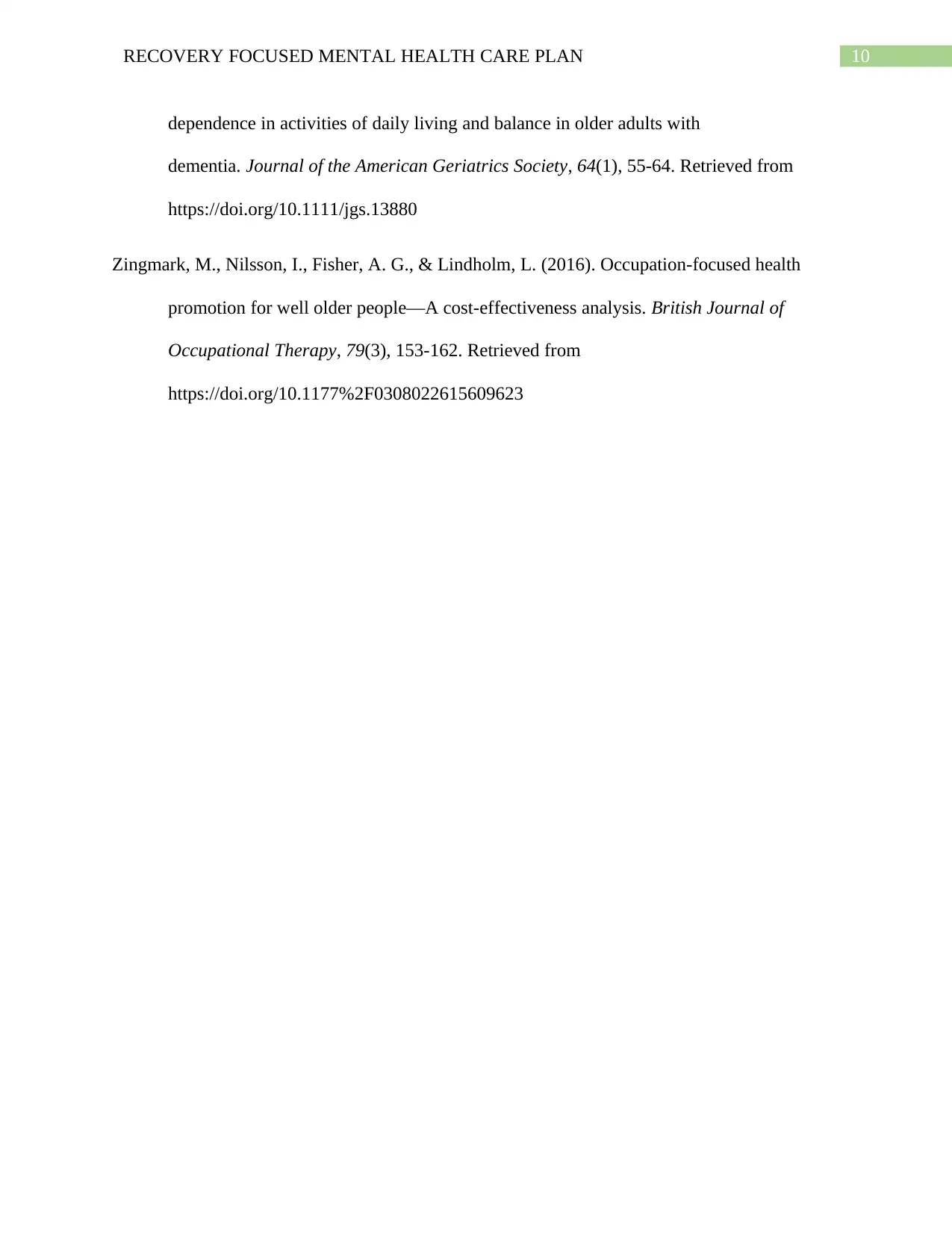
10RECOVERY FOCUSED MENTAL HEALTH CARE PLAN
dependence in activities of daily living and balance in older adults with
dementia. Journal of the American Geriatrics Society, 64(1), 55-64. Retrieved from
https://doi.org/10.1111/jgs.13880
Zingmark, M., Nilsson, I., Fisher, A. G., & Lindholm, L. (2016). Occupation-focused health
promotion for well older people—A cost-effectiveness analysis. British Journal of
Occupational Therapy, 79(3), 153-162. Retrieved from
https://doi.org/10.1177%2F0308022615609623
dependence in activities of daily living and balance in older adults with
dementia. Journal of the American Geriatrics Society, 64(1), 55-64. Retrieved from
https://doi.org/10.1111/jgs.13880
Zingmark, M., Nilsson, I., Fisher, A. G., & Lindholm, L. (2016). Occupation-focused health
promotion for well older people—A cost-effectiveness analysis. British Journal of
Occupational Therapy, 79(3), 153-162. Retrieved from
https://doi.org/10.1177%2F0308022615609623
1 out of 11
Related Documents
Your All-in-One AI-Powered Toolkit for Academic Success.
+13062052269
info@desklib.com
Available 24*7 on WhatsApp / Email
![[object Object]](/_next/static/media/star-bottom.7253800d.svg)
Unlock your academic potential
Copyright © 2020–2026 A2Z Services. All Rights Reserved. Developed and managed by ZUCOL.





